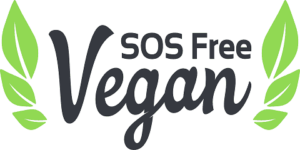Last Updated on April 23, 2023 by admin
On this blog, we’ve explored why salt and sugar are no good for you. These addictive, heavily-processed ingredients drive our cravings, disrupt satiety, and could contribute to a whole slew of health problems.
What about oils? Some oils have a decent amount of monounsaturated and polyunsaturated fats, which some people argue are healthy. Does that mean oil is necessarily bad for you? In this article, we’ll explore this very concept, giving you the definitive answer you need to start your SOS-free veganism journey.
How Oils Deceive You
Oils are – be some – typically touted as being healthy for their monounsaturated and polyunsaturated fats. Most oils tend to contain saturated fat more than anything, though. They’re also very heavy in calories. If you remember from our first post on this blog, you eat about 120 calories for a single tablespoon of oil. A tablespoon really isn’t that much!
What about “benefits” of monounsaturated and polyunsaturated fats that some people say are healthy? Do you miss out on those by giving up oil? Even if you believe this you will not miss out on those “benefits” If you consume avocados, raw nuts and seeds, olives, and soybeans, you should still get your amount of these fats as part of your SOS-free vegan diet.
Don’t be fooled by oils; you don’t need them!
Why Is Oil Bad For You?
Okay, so we’ve already established that oils are deceptive. Oils also have a lot of calories for a small amount of the stuff.
If you want to know more ways they’re bad for you, look no further. Let’s begin with the same video from Dr. Alan Goldhamer we cited in our article about the dangers of salt. He also talked about oils. You can watch the video below.
Dr. Goldhamer says, calorie-dense, fractionated foods such as oil don’t “exist in nature” and thus wouldn’t be included as part of a whole foods diet.
He says that it’s a little too easy for some people to cling to the healthfulness of oil because certain ones (like olive oil, for instance) are better for you than corn or safflower oil. “Because it’s less bad doesn’t make it healthy,” Goldhamer states.
Dr. Caldwell Esseltyn, another SOS-free proponent, also spoke up about the importance of quitting all oils. Check it out here.
Esseltyn calls oil (especially olive oil) “seductive” because it can boost good cholesterol in the short-term. He then cites a 1990 study from Dr. David H. Blankenhorn, who turned the perception of oil on its head. Blankenhorn’s research showed what we know now: there’s a connection between the consumption of oils and coronary conditions.
It’s possible for blood coagulation factor VII to be triggered from oil at the same rate as consumption of butter, Dr. Esseltyn says. What is factor VII? It’s a blood-clotting protein associated with thrombogenesis, or healthy clotting.
By removing the consumption of oils from your diet, you can lessen your chances of getting some types of cancer as well as eliminate acid reflux, hormonal issues, bowel irregularities, and acne. You can also enjoy boosted immune health.
Tips for Cutting Oils Out of Your Life
Hopefully, the words of Dr. Goldhamer and Dr. Esseltyn have convinced you to reconsider whether you really want to continue consuming oils. If you are ready to ditch them for good, you may wonder how to go back doing so.
In another video, Dr. Goldhamer talks about the addictive qualities of salt, sugar, and oil and how to quit the cravings.
He admits that “withdrawal from these substances is difficult.” Dr. Goldhamer suggests going on a medically-supervised fast, which he likens to cleaning out your computer’s hard drive. It’s like a reset for the body, he explains, allowing “good food to taste good”. That then “makes it somewhat easier to resist the addictions you have to these artificial chemicals that are ultimately going to compromise your health.”
It is normal to have cravings while trying to quit. In the above video, Dr. Goldhamer says that it takes 30 days to get over a salt addiction and three months to cut out an addiction to fats. Considering that oils are quite fatty, you might be in for an uphill battle. Quitting is possible, though!
Here are some tips for going oil-free for good:
- Shop around and find oil substitutes you like that can be used for cooking and flavoring meals.
- Get creative. If you’re in a pinch, you can use fruit puree, applesauce, and even mashed bananas in place of coconut, canola, and olive oil.
- Cook at home for the first few months. Buy all your food and ingredients at vegan grocery stores so you can ensure they’re truly oil-free.
- When you go out to eat, ask the waiter questions about the menu. Remember, you don’t only have to worry about whether oil is on/in the food, but whether your meal was cooked in oil, too.
- Set small, short-term goals for yourself. Try to quit eating oil for a week. Next, make it two weeks, then three weeks, and so on. Before you know it, you’ll be over the three-month hump and you’ll find you don’t even want oil anymore.
- If you start to waver, remember your health. You could have a stronger, healthier heart by cutting out oils. That should motivate you during those tough times when cravings take over.
Conclusion
Oils have a high saturated fat content. You also consume more than 100 calories in just one tablespoon of oil. Considering oil is used as a topping or flavor enhancer and not eaten on its own, that’s a huge waste of calories.
SOS-free vegan experts like Dr. Alan Goldhamer and Dr. Caldwell Esseltyn recommend cutting out all oils completely. It may take you three months to get over the cravings, but your body will thank you!
Recent Posts
You’ve read this blog and it’s certainly piqued your curiosity about what it means to be an SOS-free vegan. You’ve learned about this branch of veganism from our introductory post and maybe...
Vegans Desserts! Few things taste better than a refreshing ice cream cone on a hot summer’s day. Now that you’ve given up sugar and oil (not to mention salt) and gone vegan though, you may feel...

